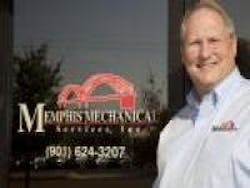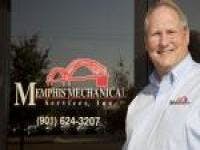Contractor Insights: Memphis Mechanical Services, Inc.
Richard Luhm is founder and president of Memphis Mechanical Services, Inc., Memphis, TN. After graduation from high school, and attending Memphis State University in the early 70s, he became intrigued with the “low temp” side of the business. In 1978, Richard joined the staff of Maynard Food Store Equipment in Memphis. In 1984 Luhm was part of a group that purchased the Memphis Branch of Maynard Food Store Equipment. He was named general manager of a new firm, Systems-Plus Refrigeration, Inc. In May of 2001 Luhm formed Memphis Mechanical Services. Within three successful months, the business was incorporated. The company’s service and installation mix is 85% refrigeration and 15% light commercial. Memphis Mechanical serves a 100-mile radius within the tri-state region of Tennessee, Arkansas, and Mississippi.
Q: You had a VERY early start in HVAC.
A: Yes. When I was five, I earned a dollar a day carrying lights and tools for my HVAC technician father, George Luhm. I was the richest kid on the block!
Q: How are you using technology to work better and faster?
A: We’ve mandated that all of our service technicians use smart phones, and we use a Drop Box regularly. We have several files we load onto the Drop Box server, as we find technical literature that’s adaptable in the field. It’s quick and instructional, instead of the black manual they had in their trucks and didn’t read. We can manage the Drop Box easier, and provide new information that comes along, like information on carbon dioxide (CO2)or other new refrigerants; anything that keeps them thinking and moving forward. We want them to be informed, and to be able to answer customer questions.
Q: What’s one key to providing excellent service?
A: Communication! Tell the customer everything they need to hear. Some managers want to know every step you took, and others just want to know that you’ve got it fixed. We take the time with our technicians to make sure they understand that difference, who requires what amount of information. We want to relate to our customers and talk their language.
Q: Describe a recent successful project.
A: We were faced with the challenge of remodeling a store in an older neighborhood. The store was originally a Safeway store built in the mid-1970s. It had two 25 hp compressors on each of the four Hussmann twin racks, for a total of 200 hp. The customer was having problems with leaks and oil failure issues, and the cases were old. The customer wanted the store remodeled entirely. We looked at putting in a new motor room, but the cost was going to exorbitant due to seismic regulations and other requirements. So, we did a complete remodel: we rebuilt the current racks. We changed every valve and control. We went with a Bitzer compressor, CPC Einstein E2 controls, and we reengineered the systems in the store when they changed to new Hussmann cases. We had more energy efficient cases, frameless glass doors. The store had added seven conventional units on the roof, 5hp to 7 hp. We were able to turn those seven units off. It’s currently showing an $8,000/month utility savings.
Q: Have you ventured into any CO2 projects?
A: There haven’t been any CO2 projects in Memphis yet. There are possibly a couple coming down the pike, and I think we’ll be involved in that. We work closely with the Hussmann organization on projects, and offer help in the service area for lot of Hussmann’s warranty support. We’re using secondary coolants in the form of glycol. We just installed a large secondary coolant system on the medium-temp side, and a DX system on the low-temp side for Restaurant Depot.
Q: What’s the major challenge you foresee in getting up to speed on a CO2 or propane-refrigerant system?
A: The training. Even if a manufacturer sends someone from the factory who can teach you as much as he knows, the contractor only has one or two ‘start-up’ or service technicians on the jobsite to take it all in. You’ve got to make sure your guys can train the others. Fortunately we all know the physics of it. You have to learn the new pressures, and sometimes the valves work differently. It’s usually not that hard to actually pick up the mechanical operation of the system. The thing that’s become more difficult in last few years is understanding the safety aspect, as we now see in the era of R410A.
Q: We so often find a “family” atmosphere at the best contracting firms. Seems like yours is no exception.
A: We truly care about each other, and we all share a common belief that the customer is why we’re here. Everything we do is so that the customer realizes the value in having professionals that care.
That’s what makes it so great: we all believe it!
About the Author
Terry McIver
Content Director - CB
As director of content for Contracting Business, he produces daily content and feature articles for CB's 38,000 print subscribers and many more Internet visitors. He has written hundreds, if not two or three, pieces of news, features and contractor profile articles for CB's audience of quality HVACR contractors. He can also be found covering HVACR industry events or visiting with manufacturers and contractors. He also has significant experience in trade show planning.

